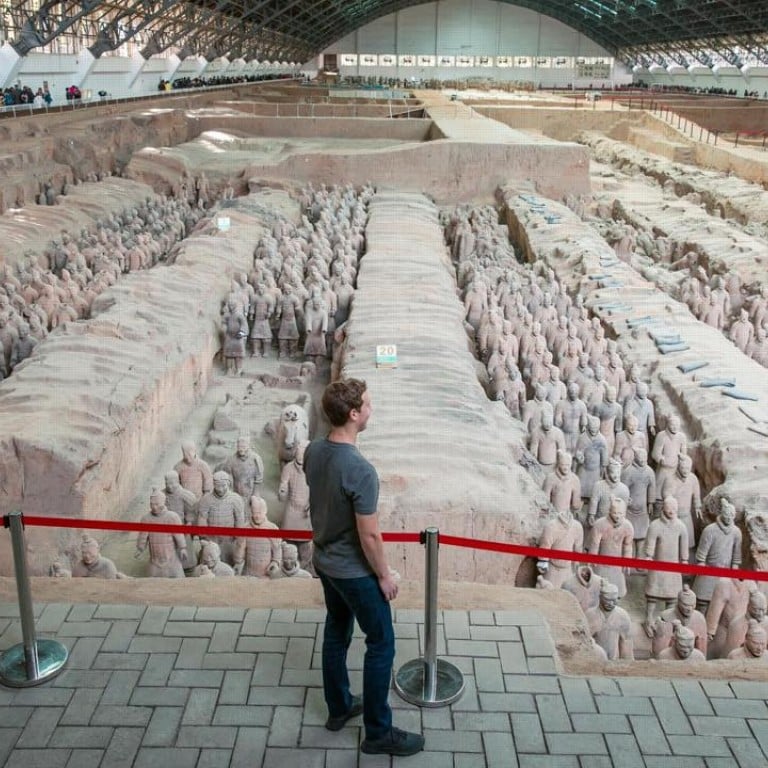
Back against the wall: Zuckerberg visits Terracotta Warriors, jogs around Xi’an and posts Facebook pics despite website being blocked in China
Facebook CEO Mark Zuckerberg took a trip to the ancient Chinese capital city of Xi’an this week, where he took a leisurely run along its famous city wall amid slight drizzle on Monday and visited the site of the Terracotta Warriors.
We know this because he posted photos and updates of the trip on his Facebook wall during his stay in the country. This is a little strange because the social media site has been blocked in China for seven years.
Twitter, Google and a number of other social media and news are also blocked in the country.
Although internet users can effectively jump over China’s Great Firewall using a virtual private network (VPN), which channels traffic through proxy servers, would Zuckerberg have risked angering those with whom he wants to reconcile by resorting to this measure?
READ MORE: Have a ‘strong sense of mission’, urges Facebook founder Zuckerberg in first Mandarin speech for Chinese students
It is unclear how Zuckerberg managed to upload the photos while still in China. He could have dodged the censors by using international data roaming on a US carrier such as T-Mobile or AT&T, but resorting to the use of a VPN may have been quicker and easier. VPN services can be rented for as little as US$5 a month and usually serve as a means of bypassing China’s censors. But recently Beijing has also been cracking down on these.
In August, popular VPN service providers such as Astrill warned users of potential disruptions to their services leading up to a military parade in Beijing last month marking the 70th anniversary of the second world war.
While it is not illegal for people to use VPN services in China, officials there have stressed that foreign-run VPNs must register with the state’s Ministry of Industry and Information Technology.
“I have not heard of any foreign company that has registered,” Fang Binxing, a senior online security expert, was quoted as telling China’s state-run Global Times earlier this year.
Fang said unregistered VPN service providers are not protected under Chinese law.
According to local regulations, only Chinese companies can register to establish a VPN service. Foreign companies who wish to do so are required to find a Chinese partner.
READ MORE: Facebook, Twitter unblocked for Beijing 2015 World Championships in Athletics - but only at sporting venues
Zuckerberg’s effortsto learn Putonghua and his attempt to read science-fiction novel The Three-Body Problem by Chinese author Liu Cixin has been seen as an attempt to show the Chinese government that his interest in the country is genuine as he bids to often its stance against Facebook.

His efforts seem to be paying off – Zuckerberg got significant face time with Chinese President Xi Jinping at a recent internet conference in Seattle, US, during which they had an exchange in Chinese.
On Saturday, Zuckerberg made a speech in Putonghua at at Tsinghua University in Beijing, which generated much buzz among China’s internet users, many of whom believe China will eventually open back up to Facebook.
“[Zuckerberg] is here, speaking Putonghua ... it’s only a matter of time before Facebook will be [in China] too,” wrote one user on Chinese microblogging platform Weibo.
Zuckerberg’s next stop is the Indian Institute of Technology in New Delhi, where he will host a question and answer session with students Wednesday.
A status update on his Facebook wall on Tuesday informed users that a safety check function has been enabled on Facebook to allow users in the earthquake-affected areas of Afghanistan, Pakistan and surrounding regions to mark themselves as “safe” if they are unharmed. People can check on family and friends using the same tool.

